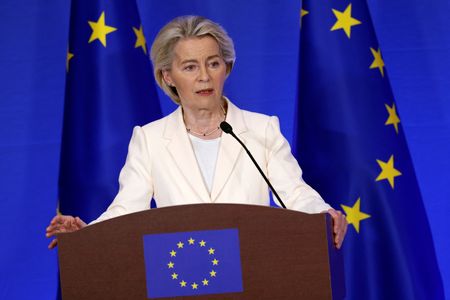By Simon Jessop and Iain Withers
LONDON (Reuters) -Britain’s biggest private sector pension scheme plans to step up lobbying of governments, regulators and standard-setters to push for faster action amid a worsening climate outlook, its investment chief told Reuters.
The Universities Superannuation Scheme, which manages nearly 78 billion pounds ($105.67 billion), has reduced emissions linked to its own portfolio. But Simon Pilcher said there was only so much schemes could achieve through asset reallocation.
“That’s why the high-value engagement is with governments and regulators to create the environment where the low-carbon action happens. It is, I would say, 90% up to them and only 10% up to capital allocation,” the chief executive of USS Investment Management said.
The British government in May signed an accord with pension investors to try to scale up investment in UK infrastructure and green programmes to help the country reach its net-zero goal, which is enshrined in law.
Pilcher said changing the rules to make it easier for companies and consumers to overhaul their climate-damaging practices was the most effective lever for change, and the scheme had decided to “turn the dial up” on its lobbying efforts.
“Corporates will change their activity when it’s sane for them to do that,” Pilcher said.
“There needs to be a strong financial interest for those businesses to do the sensible thing; no one is going to spend money if, bluntly, they’re going to be wasting that money.”
While USS IM has no formal arrangements with other investors, it has good relationships with the UK’s local government pension schemes, and investors such as Railpen and Nest, the country’s biggest auto-enrolment scheme, making it an influential voice within the sector.
In the UK, lobbying would include talking to the Department for Energy Security and Net Zero about its strategy and encouraging them to, for example, reform the planning process to make it easier to connect renewables to the electricity grid.
The United Nations said last October the world was on course to hit more than 3 degrees Celsius of warming above the pre-industrial average by the end of the century, based on current emissions-reduction pledges by countries, way off the world’s goal of capping warming at 1.5 C.
($1 = 0.7381 pounds)
(Reporting by Simon Jessop;Editing by Alison Williams)









